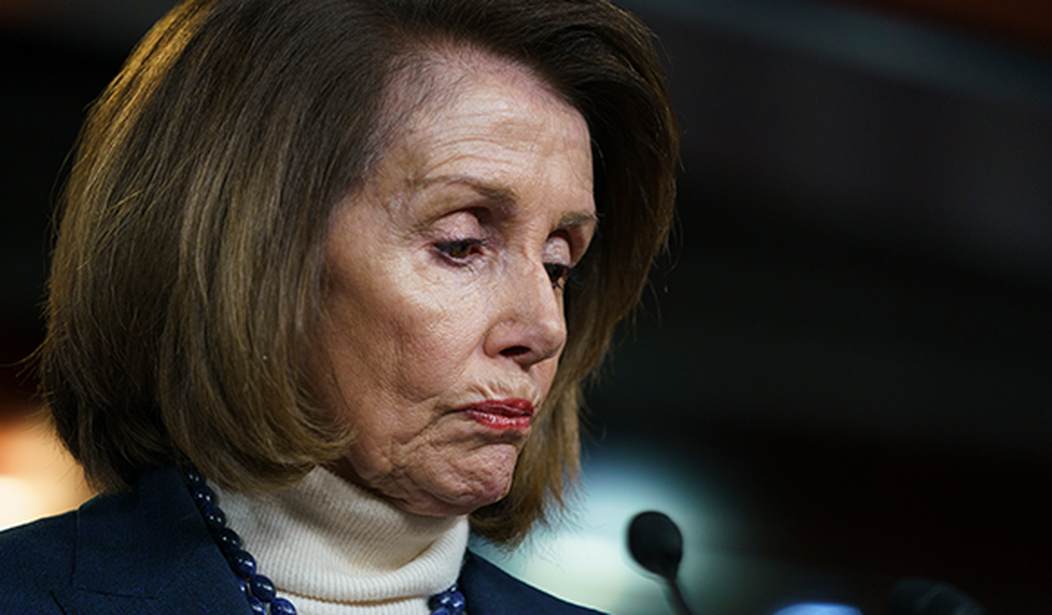President Trump acceded to Democrats' demands on Friday, agreeing to reopen seven federal agencies for three weeks -- without any guaranteed money for new border barriers. This development was widely seen as a cave by the president, who ended up conceding to the opposition's sequencing and terms. As he shouldered blame and watched his polling numbers slide, did Trump gain anything over the course of the 35-day partial shutdown? If you squint hard enough in search of silver linings, this is probably the best you might come up with:
Overall, predictable denouement & why GOP leaders counseled against this strategy. OTOH, many Dems reiterated support for new barriers over past month & Trump demonstrated appetite for historic-length shutdowns. He won’t get a big win, but if he gets something, he should take it.
— Guy Benson (@guypbenson) January 25, 2019
In his Rose Garden speech, Trump explicitly said that absent an acceptable deal by February 15th, either another shutdown would ensue, or he'd go the legally-dubious "emergency powers" route -- which would likely get tied up in the courts for a sizable chunk of his remaining term. Trump's willingness to endure a lengthy, grueling fight over a partial shutdown has now been established, but Democrats may bet that last week's outcome means he's no longer inclined to engage in a similar battle. That may be a relatively safe bet. But it is also true that over the course of the recent impasse, many Democrats went on television and insisted that they weren't opposed to the construction of strategically-placed new barriers along the southern border, from newly-elected moderates, to influential Senators, to members of Nancy Pelosi's House leadership team:
Hoyer on Wall: "I Think Physical Barriers Are Part Of The Solution"https://t.co/XHyuWlluVJ
— RCP Video (@rcpvideo) January 23, 2019
Recommended
If Steny Hoyer believes additional barriers are "part of the solution," and James Clyburn (the third-ranking Democrat in the lower chamber) has publicly floated a plan under which the opposition could agree to funding Trump's entire $5.7 billion border security request (albeit not necessarily for 'the wall'), it would seem we have a basis for a reasonable deal. Will Pelosi derail a compromise by continuing to reject any new barrier funding, even after Trump buckled to Democrats' insistence about the pre-conditions for a negotiation? Notably, during her joint press conference with Chuck Schumer, she did not rule out money for barriers. She didn't explicitly rule them in, which would have been an element of the Benson Plan, but in light of her previous stance, declining to say 'no' looks like progress. Keep in mind that even though Democrats were more united than Republicans over the past month (which is not unusual), and even though relatively strong GOP unity was reportedly on the brink of falling apart, rank-and-file Democrats were also starting to break with Pelosi. Perhaps there was more dissension in the ranks than the public realized:
Just as she wore down the rebels gunning for her this winter, @SpeakerPelosi waited Trump out as the public pressure was building. She also kept Dems publicly* unified — even as many were privately freaking out & almost reaching a breaking point. https://t.co/51ZEXm9B00
— Rachael Bade (@rachaelmbade) January 26, 2019
And despite the obvious and undeniable damage done to the president, who wouldn't have pulled the plug if he felt he was winning, it doesn't appear as though Nancy Pelosi's image emerged from this standoff as a major winner. Partisans are cheering her "crushing" of Trump, and the national media is naturally swooning along, but average Americans once again view her more unfavorably than any major politician in the country:
More NBC/WSJ poll: Pelosi’s negatives shot up during government shutdown more than any pol // now the most unpopular politician tested in the survey. pic.twitter.com/pSMBFydwx7
— Josh Kraushaar (@HotlineJosh) January 27, 2019
She's seven points deeper underwater than the president, even after her victory. Democrats won the battle, and Trump will almost certainly get less than what he'd like in any resulting deal (his previous offer was pretty fair, in my opinion). But if the empowered opposition gets cocky and decides to pull a bait-and-switch after vowing good-faith negotiations, they could squander their advantage. In the meantime, as talks are underway, Republicans should consider introducing or passing bills that would pay federal workers during future partial shutdowns (this pressure point was starting to squeeze some Democrats), or get behind efforts to effectively end 'shutdowns' as they currently exist. I'll leave you with an angry and betrayed Ann Coulter, author of In Trump We Trust, attacking the president as weak and cowardly on Bill Maher's show:
Bill Maher to Ann Coulter: So 'What Was Your First Clue' Trump's a 'Lying Con Man?' https://t.co/eBCxduPPio pic.twitter.com/wtiIX8qGNV
— Mediaite (@Mediaite) January 26, 2019
Is a primary challenge brewing?

























Join the conversation as a VIP Member